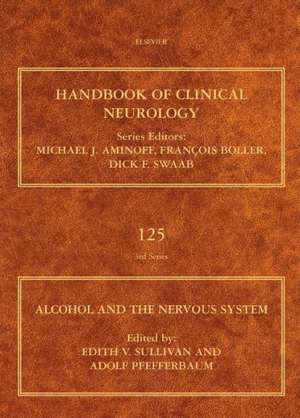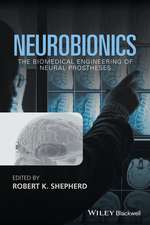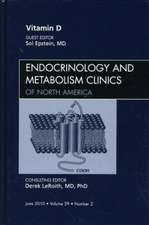Alcohol and the Nervous System: Handbook of Clinical Neurology, cartea 125
Editat de Edith V. Sullivan, Adolf Pfefferbaumen Limba Engleză Hardback – 25 noi 2014
- The first focused reference specifically on alcohol and the brain
- Details our current understanding of how alcohol impacts the central nervous system
- Covers clinical and social impact of alcohol abuse disorders and the biomedical consequences of alcohol abuse
- Includes section on neuroimaging of neurochemical markers and brain function
Din seria Handbook of Clinical Neurology
- 20%
 Preț: 1274.52 lei
Preț: 1274.52 lei - 20%
 Preț: 1311.43 lei
Preț: 1311.43 lei - 23%
 Preț: 1286.74 lei
Preț: 1286.74 lei - 20%
 Preț: 1344.20 lei
Preț: 1344.20 lei - 20%
 Preț: 1349.51 lei
Preț: 1349.51 lei - 24%
 Preț: 1275.78 lei
Preț: 1275.78 lei - 20%
 Preț: 1344.02 lei
Preț: 1344.02 lei - 20%
 Preț: 1339.70 lei
Preț: 1339.70 lei - 20%
 Preț: 1316.98 lei
Preț: 1316.98 lei - 20%
 Preț: 1315.38 lei
Preț: 1315.38 lei - 20%
 Preț: 1329.13 lei
Preț: 1329.13 lei - 20%
 Preț: 1313.06 lei
Preț: 1313.06 lei - 5%
 Preț: 1309.43 lei
Preț: 1309.43 lei - 5%
 Preț: 1300.74 lei
Preț: 1300.74 lei - 20%
 Preț: 1302.98 lei
Preț: 1302.98 lei - 20%
 Preț: 1304.03 lei
Preț: 1304.03 lei - 20%
 Preț: 1304.66 lei
Preț: 1304.66 lei - 20%
 Preț: 1303.13 lei
Preț: 1303.13 lei - 20%
 Preț: 1319.00 lei
Preț: 1319.00 lei - 20%
 Preț: 1312.90 lei
Preț: 1312.90 lei - 5%
 Preț: 1304.05 lei
Preț: 1304.05 lei - 5%
 Preț: 1305.77 lei
Preț: 1305.77 lei - 20%
 Preț: 1303.05 lei
Preț: 1303.05 lei - 20%
 Preț: 1312.24 lei
Preț: 1312.24 lei - 20%
 Preț: 1304.66 lei
Preț: 1304.66 lei - 20%
 Preț: 1300.34 lei
Preț: 1300.34 lei - 20%
 Preț: 1148.33 lei
Preț: 1148.33 lei - 5%
 Preț: 1221.37 lei
Preț: 1221.37 lei - 25%
 Preț: 1256.05 lei
Preț: 1256.05 lei - 5%
 Preț: 1203.24 lei
Preț: 1203.24 lei - 21%
 Preț: 1062.72 lei
Preț: 1062.72 lei - 23%
 Preț: 1126.07 lei
Preț: 1126.07 lei - 19%
 Preț: 1070.63 lei
Preț: 1070.63 lei - 20%
 Preț: 1069.47 lei
Preț: 1069.47 lei - 25%
 Preț: 1178.93 lei
Preț: 1178.93 lei - 5%
 Preț: 1187.28 lei
Preț: 1187.28 lei - 25%
 Preț: 1165.32 lei
Preț: 1165.32 lei - 19%
 Preț: 1180.73 lei
Preț: 1180.73 lei - 25%
 Preț: 1165.86 lei
Preț: 1165.86 lei - 25%
 Preț: 1175.31 lei
Preț: 1175.31 lei - 5%
 Preț: 1343.67 lei
Preț: 1343.67 lei - 5%
 Preț: 1338.90 lei
Preț: 1338.90 lei - 5%
 Preț: 1175.59 lei
Preț: 1175.59 lei - 5%
 Preț: 1165.40 lei
Preț: 1165.40 lei - 20%
 Preț: 1225.89 lei
Preț: 1225.89 lei - 24%
 Preț: 1165.66 lei
Preț: 1165.66 lei - 25%
 Preț: 1226.82 lei
Preț: 1226.82 lei
Preț: 1178.74 lei
Preț vechi: 1462.20 lei
-19% Nou
Puncte Express: 1768
Preț estimativ în valută:
225.58€ • 234.64$ • 186.23£
225.58€ • 234.64$ • 186.23£
Carte tipărită la comandă
Livrare economică 07-21 aprilie
Preluare comenzi: 021 569.72.76
Specificații
ISBN-13: 9780444626196
ISBN-10: 0444626190
Pagini: 704
Ilustrații: Approx. 110 illustrations (40 in full color)
Dimensiuni: 184 x 260 x 38 mm
Greutate: 2.08 kg
Editura: ELSEVIER SCIENCE
Seria Handbook of Clinical Neurology
ISBN-10: 0444626190
Pagini: 704
Ilustrații: Approx. 110 illustrations (40 in full color)
Dimensiuni: 184 x 260 x 38 mm
Greutate: 2.08 kg
Editura: ELSEVIER SCIENCE
Seria Handbook of Clinical Neurology
Public țintă
Researchers and graduate students in neuroscience and neurology with an interest in addiction science, and clinical neurologists.Cuprins
Section 1 Introduction
1. Alcoholism: diagnosis, prognosis, epidemiology, and burden of the disease 2. Perspectives on the Neuroscience of Alcohol from the National Institute on Alcohol Abuse and Alcoholism
Section 2 Animal Models: Neurochemistry and Metabolism of Alcohol
3. Neurocircuitry of Alcoholism: Synthesis from Animal Models 4. Metabolism 5. Use of animal models of alcohol-related behavior
Section 3 Molecular Basis of Alcoholism
6. Molecular Basis of Alcoholism
Section 4 Neurological Signs and Consequences
7. Acute: Intoxication and Poisoning--Diagnosis and Treatment 8. Acute: Withdrawal--Diagnosis and Treatment 9. Neurochemical mechanisms of alcohol withdrawal 10. Molecular and neurological responses to chronic alcohol use
Section 5 Neuropsychology
11. Methods of Association and Dissociation for Establishing Selective Brain-Behavior Relations 12. Profiles of impaired, spared, and recovered neuropsychological processes in alcoholism 13. Component processes of memory in alcoholism: pattern of compromise and neural substrates 14. Decision Making, Risky Behavior, and Alcoholism 15. Motor Systems and Postural Instability 16. Sex differences in alcohol-related neurobehavioral consequences
Section 6 Neuroimaging of Brain Macrostructure and Microstructure
17. Structural and microstructural imaging of the brain in alcohol use disorders
Section 7 Neuroimaging of Neurochemical Markers
18. Molecular imaging in alcohol dependence 19. Brain proton magnetic resonance spectroscopy of alcohol use disorders
Section 8 Neuroimaging of Brain Function
20. Cognition, emotion, and attention 21. The neurobiology of alcohol craving and relapse 22. Compensatory recruitment of neural resources in chronic alcoholism
Section 9 Neuroelectrophysiology
23. Understanding alcohol use disorders with neuroelectrophysiology 24. Sleeping EEG
Section 10 Fetal Alcohol Spectrum Disorder
25. Neurobehavioral, neurological, and neuroimaging characteristics of fetal alcohol spectrum disorders 26. Fetal alcohol spectrum disorder: pathogenesis and mechanisms 27. Current hypotheses on the mechanisms of alcoholism
Section 11 Adolescent Drinking
28. The effect of alcohol use on human adolescent brain structures and systems
Section 12 Other topics
29. Peripheral Systems: Neuropathy 30. Pharmacological treatment of alcoholism 31. Alcohol-Medical Drug Interactions 32. Genetics of alcoholism 33. Co-occurring psychiatric disorders and alcoholism 34. Hepatic encephalopathy in alcoholic cirrhosis 35. Neuropathology of Alcoholism 36. Genetic differences in response to alcohol 37. Epidemiology of drinking, alcohol use disorders, and related problems 38. Alcohol and the law 39. Clinical Management of Alcohol Use Disorders in the Neurology Clinic
1. Alcoholism: diagnosis, prognosis, epidemiology, and burden of the disease 2. Perspectives on the Neuroscience of Alcohol from the National Institute on Alcohol Abuse and Alcoholism
Section 2 Animal Models: Neurochemistry and Metabolism of Alcohol
3. Neurocircuitry of Alcoholism: Synthesis from Animal Models 4. Metabolism 5. Use of animal models of alcohol-related behavior
Section 3 Molecular Basis of Alcoholism
6. Molecular Basis of Alcoholism
Section 4 Neurological Signs and Consequences
7. Acute: Intoxication and Poisoning--Diagnosis and Treatment 8. Acute: Withdrawal--Diagnosis and Treatment 9. Neurochemical mechanisms of alcohol withdrawal 10. Molecular and neurological responses to chronic alcohol use
Section 5 Neuropsychology
11. Methods of Association and Dissociation for Establishing Selective Brain-Behavior Relations 12. Profiles of impaired, spared, and recovered neuropsychological processes in alcoholism 13. Component processes of memory in alcoholism: pattern of compromise and neural substrates 14. Decision Making, Risky Behavior, and Alcoholism 15. Motor Systems and Postural Instability 16. Sex differences in alcohol-related neurobehavioral consequences
Section 6 Neuroimaging of Brain Macrostructure and Microstructure
17. Structural and microstructural imaging of the brain in alcohol use disorders
Section 7 Neuroimaging of Neurochemical Markers
18. Molecular imaging in alcohol dependence 19. Brain proton magnetic resonance spectroscopy of alcohol use disorders
Section 8 Neuroimaging of Brain Function
20. Cognition, emotion, and attention 21. The neurobiology of alcohol craving and relapse 22. Compensatory recruitment of neural resources in chronic alcoholism
Section 9 Neuroelectrophysiology
23. Understanding alcohol use disorders with neuroelectrophysiology 24. Sleeping EEG
Section 10 Fetal Alcohol Spectrum Disorder
25. Neurobehavioral, neurological, and neuroimaging characteristics of fetal alcohol spectrum disorders 26. Fetal alcohol spectrum disorder: pathogenesis and mechanisms 27. Current hypotheses on the mechanisms of alcoholism
Section 11 Adolescent Drinking
28. The effect of alcohol use on human adolescent brain structures and systems
Section 12 Other topics
29. Peripheral Systems: Neuropathy 30. Pharmacological treatment of alcoholism 31. Alcohol-Medical Drug Interactions 32. Genetics of alcoholism 33. Co-occurring psychiatric disorders and alcoholism 34. Hepatic encephalopathy in alcoholic cirrhosis 35. Neuropathology of Alcoholism 36. Genetic differences in response to alcohol 37. Epidemiology of drinking, alcohol use disorders, and related problems 38. Alcohol and the law 39. Clinical Management of Alcohol Use Disorders in the Neurology Clinic










